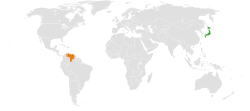Japan–Venezuela relations
In the following article we will explore Japan–Venezuela relations, a topic that has generated great interest in contemporary society. Japan–Venezuela relations is a topic that covers various areas of study and has a significant impact on people's daily lives. Throughout this article we will examine different aspects of Japan–Venezuela relations, from its origins and evolution to its implications today. In addition, we will analyze different perspectives and opinions on Japan–Venezuela relations, with the aim of providing a comprehensive and enriching vision on this topic. Join us on this tour of Japan–Venezuela relations and discover its importance in today's world.
 | |
Japan |
Venezuela |
|---|---|

Japan–Venezuela relations (Spanish: Relaciones Japón-Venezuela, Japanese: 日本とベネズエラの関係) are foreign relations between Japan and Venezuela. Formal diplomatic relations between the countries were established in August 1938. Venezuela broke off diplomatic ties with Japan (and the other Axis Powers) in December 1941, shortly after the Japanese attack on Pearl Harbor.
In 1999, Venezuelan President Hugo Chavez made a three-day trip to Japan.
Japanese banks Marubeni and Mitsui loaned Venezuela $3.5 billion in 2007 to be repaid in oil. The Japan Bank for International Cooperation provided $1.89 billion in loans to support the banks.
Japan imported US$1 bn worth of goods from Venezuela in 2008, mainly aluminium, iron ore and cacao.
Hugo Chavez made another two-day trip in 2009, during which he met Prime Minister Taro Aso. During the trip they agreed to cooperate on oil and gas developments and form a committee to study financing development and exploration. Japan and Venezuela signed a dozen other accords as part of Chavez's visit.
On 23 December 2009, Chavez threatened to expropriate Toyota Motor Corp.'s local assembly plant.
In February 2019, Japan recognized Venezuelan opposition leader Juan Guaido as Venezuelan president, cutting off relations with the disputed government of left-wing Nicolás Maduro, the successor of late Hugo Chavez.
See also
References
- ^ Ministry of Foreign Affairs of Japan: Japan-Venezuelan relations
- ^ "Venezuela Breaks with Axis Regimes," New York Times, Jan. 1, 1942
- ^ "Japan-Venezuela Relations".
- ^ "Japan, Venezuela to Cooperate on Oil, Gas Projects (Update3)". Bloomberg. 6 April 2009.
- ^ "Venezuela's President Threatens Toyota, GM". The Wall Street Journal. Archived from the original on 2023-05-28.
- ^ "Japan recognizes Guaido as Venezuelan president".
- Yamaguchi, Mari (April 6, 2009). "Japanese, Venezuelan leaders agree to deepen ties". Yahoo News.
- Kim, Chang-Ran (April 6, 2009). "Japan, Venezuela sign broad oil, gas cooperation". Reuters UK.
- "VENEZUELA BREAKS WITH AXIS REGIMES; Move Hailed as Evidence of Nation's Faithfulness to American Obligations BRAZIL REAFFIRMS STAND Vargas Declares All Doubts Were Resolved by Attack on the United States". New York Times. January 1, 1942.
- "Japan: Venezuelan President Chavez arrives for three-day visit". Kyodo News Service, Tokyo. October 13, 1999.
External links
- Japan-Venezuela Relations from Ministry of Foreign Affairs of Japan
- Official website of The Embassy of Venezuela in Japan

